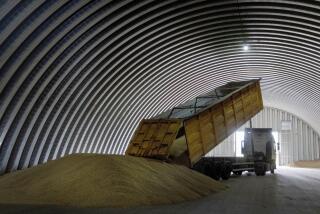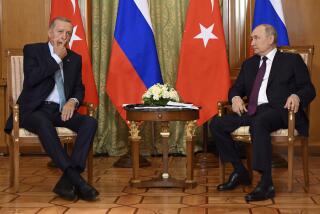Russia joins World Trade Organization
WASHINGTON — After nearly 20 years of negotiations, Russia has finally joined the ranks of the World Trade Organization, marking what analysts see as one of the last post-Cold War moves to bring Russia into the international economic community.
Russia’s formal entry into the WTO on Wednesday also made it the biggest economy to become a member of the Geneva-based trade body since China joined in late 2001.
China’s entry paved the way for a rapid acceleration of exports of manufactured goods to the U.S., contributing to a sharp increase in America’s trade deficit. But Russia’s entry to the WTO isn’t likely to have such a dramatic effect as far as U.S. economic relations are concerned.
For one thing, U.S. lawmakers have yet to grant Russia permanent normal trade relations, partly because of concerns about the country’s questionable human rights and foreign relations records.
Analysts expect Congress to change Russia’s trade status, possibly next month, which is needed for the U.S. to benefit fully from the lowered barriers that come with the WTO membership.
U.S. exports of industrial equipment and other goods and services to Russia totaled about $11 billion last year, a figure that could double in five or six years, said Anders Aslund, a Russia economy expert at the Peterson Institute for International Economics.
U.S. imports from Russia consist primarily of oil and uranium — resources that won’t be affected by the WTO status. As such, unlike the situation with China, the U.S. stands to narrow its current trade deficit with Russia, Aslund said, and the bilateral trade relations are more compatible.
“It has a big positive effect on U.S. trade,” he said.
Russia became the WTO’s 156th member. The 155th to be accepted was Montenegro in April. Vanuatu, a small island nation in the Pacific, followed Russia as the 157th WTO member.
“Both accessions show that joining the WTO remains high on the countries’ agendas, since trade can bring a predictable and stable basis for economic growth,” WTO Director-General Pascal Lamy said. “This is especially important as the world goes through troubled times and continues to suffer from one of the worst global economic crises in memory.”
Russia first applied for membership in 1993. Success now means that President Vladimir Putin, who is starting a new term, will probably hold greater sway in international economic dealings.
Membership is expected to bring better trade access and more foreign investment to the country’s roughly $2-trillion economy, the ninth largest in the world as measured by gross domestic product.
Russia’s new stature could result in an additional $162 billion in annual economic output, the World Bank estimated this spring, helping to boost incomes by as much as a 25% for Russian households.
Russia’s membership “will facilitate investment and trade, help to accelerate the modernization of the Russian economy and offer plenty of business opportunities for both Russian and European companies,” said Karel De Gucht, trade commissioner for the European Union.
The EU said that it is Russia’s top investor and trading partner and that total trade between the two last year amounted to about $383 billion worth of goods. The EU exports cars, medicine, telephones, tractors and more; Russia — the world’s largest energy exporter — sends raw materials such as oil and gas.
A report this week from Capital Economics suggested that Russia’s economy was still slowing, growing at about 3% in the early part of the third quarter after expanding about 5% in the first quarter.








